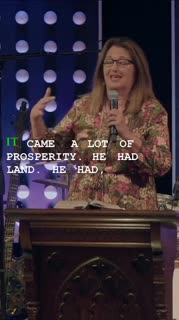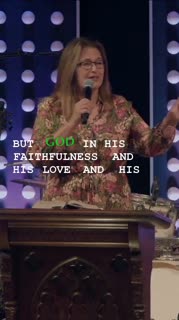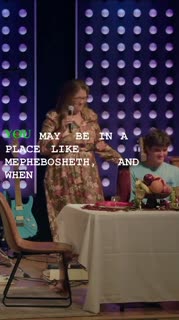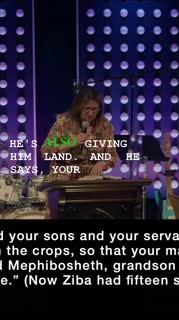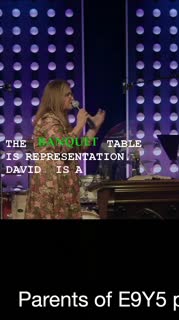God's Grace: From Desolation to Abundance
Summary
In today's message, we explored the profound story of Mephibosheth from 2 Samuel 9, a narrative that beautifully illustrates God's grace and kindness. King David, at the height of his reign, sought to show kindness to anyone left from the house of Saul for the sake of his dear friend Jonathan. This led him to Mephibosheth, Jonathan's son, who was living in Lo-Debar, a place of desolation and hardship. Despite his physical limitations and feelings of worthlessness, Mephibosheth was invited to dine at the king's table, a gesture that symbolizes God's invitation to us to partake in His grace and blessings, regardless of our past or present circumstances.
This story is a powerful reminder of God's unmerited favor. Just as David extended grace to Mephibosheth, God extends His grace to us, inviting us to His banquet table. The banquet table represents the fullness of life and spiritual nourishment that God offers. It is a place where our brokenness is covered by His righteousness, and we are welcomed as His children. The invitation is not based on our worthiness but on His love and grace.
We also reflected on the parable of the great banquet in Luke 14, where Jesus illustrates the kingdom of God as a feast prepared for all. Many who were initially invited made excuses, symbolizing how people often reject God's invitation due to worldly distractions. Yet, the invitation remains open to those who recognize their need for God, the poor, the crippled, and the spiritually blind. This parable challenges us to examine our own responses to God's invitation and to embrace the opportunity to dine with Him.
As we conclude, we are reminded that God's invitation to His table is an invitation to a life transformed by His love and grace. It is a call to leave behind our "Lo-Debar" places of despair and step into the abundance of His kingdom. Let us respond to this invitation with open hearts, ready to receive all that He has prepared for us.
Key Takeaways:
1. God's Grace is Unconditional: Just as King David sought out Mephibosheth to show kindness, God seeks us out to extend His grace, not because of our merit but because of His love. This grace invites us to partake in His blessings, transforming our lives from desolation to abundance. [36:36]
2. The Banquet Table Represents God's Provision: The banquet table symbolizes the spiritual nourishment and fullness of life that God offers. It is a place where our brokenness is covered by His righteousness, and we are welcomed as His children, regardless of our past. [47:56]
3. Responding to God's Invitation: The parable of the great banquet in Luke 14 challenges us to examine our responses to God's invitation. Many are distracted by worldly concerns, but the invitation remains open to those who recognize their need for God. [56:39]
4. Leaving Lo-Debar Behind: Lo-Debar represents places of despair and hardship in our lives. God's invitation to His table is a call to leave these places behind and step into the abundance of His kingdom, where we find healing and restoration. [44:59]
5. Embracing Our Identity in Christ: Mephibosheth's story reminds us that our worth is not determined by our circumstances or limitations. In Christ, we are invited to the king's table, where we are valued and loved as His children. [49:41]
Youtube Chapters:
- [00:00] - Welcome
- [36:36] - Introduction to Mephibosheth
- [38:21] - David's Heart of Gratitude
- [41:11] - Discovering Mephibosheth
- [43:15] - The Place of Lo-Debar
- [44:01] - Personal Reflection on Lo-Debar
- [44:59] - Mephibosheth's Journey to the King
- [45:59] - David's Invitation to Mephibosheth
- [47:56] - The Banquet Table
- [49:41] - Mephibosheth's Response
- [51:09] - The Banquet Table's Significance
- [54:44] - Transition to New Testament
- [56:39] - Parable of the Great Banquet
- [58:53] - Excuses and Rejection
- [01:02:31] - Invitation to the Broken
- [01:03:52] - Compelling Others to Come
- [01:05:35] - Personal Testimony and Invitation
- [01:11:01] - Prayer and Commitment
- [01:17:33] - Closing Worship and Reflection
Study Guide
### Bible Study Discussion Guide
#### Bible Reading
- 2 Samuel 9:1-13
- Luke 14:15-24
---
#### Observation Questions
1. What motivated King David to seek out someone from the house of Saul, and how did he express this motivation? [38:21]
2. Describe the condition and circumstances of Mephibosheth before he was brought to King David. [43:15]
3. How did Mephibosheth respond to King David's invitation to dine at the king's table, and what does this reveal about his self-perception? [49:41]
4. In the parable of the great banquet in Luke 14, what were some of the excuses given by those who were initially invited? [58:53]
---
#### Interpretation Questions
1. How does the story of Mephibosheth illustrate the concept of grace, and what parallels can be drawn between David's actions and God's grace towards us? [47:56]
2. What does the banquet table symbolize in both the story of Mephibosheth and the parable in Luke 14, and how does this symbolism relate to spiritual nourishment? [51:09]
3. In what ways does the parable of the great banquet challenge common attitudes towards God's invitation, and what does it suggest about the nature of God's kingdom? [56:39]
4. How does the concept of "Lo-Debar" as a place of desolation relate to personal experiences of hardship, and what does the invitation to the king's table signify in this context? [44:59]
---
#### Application Questions
1. Reflect on a time when you felt unworthy of God's grace, similar to Mephibosheth's feelings of worthlessness. How did you respond to God's invitation to His table? [49:41]
2. Consider the "Lo-Debar" places in your life—areas of despair or hardship. What steps can you take to accept God's invitation to leave these places behind and embrace His abundance? [44:59]
3. The parable of the great banquet highlights the distractions that can lead us to reject God's invitation. What are some distractions in your life that might be keeping you from fully accepting God's grace? [58:53]
4. How can you actively show kindness and grace to others, as David did for Mephibosheth, in your daily interactions? [38:21]
5. In what ways can you ensure that you are responding to God's invitation with an open heart, ready to receive all that He has prepared for you? [56:39]
6. Identify a specific area in your life where you need to embrace your identity in Christ, as Mephibosheth did when he was welcomed at the king's table. How can you remind yourself of your worth in Christ this week? [49:41]
7. How can you extend the invitation to God's banquet table to those around you who might feel spiritually blind or crippled? What practical steps can you take to share God's love and grace with them? [01:03:52]
Devotional
Day 1: God's Pursuit of Grace
God's grace is not something we earn; it is a gift freely given out of His love. Just as King David sought out Mephibosheth to show kindness, God actively seeks us out to extend His grace. This grace is not based on our merit or worthiness but solely on His love. In the story of Mephibosheth, we see a man who felt unworthy and broken, yet he was invited to dine at the king's table. This invitation is a powerful symbol of how God invites us to partake in His blessings, transforming our lives from desolation to abundance. God's grace is a constant reminder that no matter where we are or what we have done, His love is always reaching out to us. [36:36]
"For the grace of God has appeared, bringing salvation for all people, training us to renounce ungodliness and worldly passions, and to live self-controlled, upright, and godly lives in the present age." (Titus 2:11-12, ESV)
Reflection: Think of a time when you felt unworthy of God's love. How can you embrace His grace today, knowing it is not based on your merit but on His love?
Day 2: The Banquet of Spiritual Nourishment
The banquet table in the story of Mephibosheth represents the spiritual nourishment and fullness of life that God offers to each of us. It is a place where our brokenness is covered by His righteousness, and we are welcomed as His children, regardless of our past. This table is not just a symbol of provision but also of acceptance and belonging. In God's kingdom, we are invited to experience the richness of His love and the depth of His blessings. The invitation to the banquet table is a call to leave behind our past and step into the new life that God has prepared for us. [47:56]
"And the Lord will guide you continually and satisfy your desire in scorched places and make your bones strong; and you shall be like a watered garden, like a spring of water, whose waters do not fail." (Isaiah 58:11, ESV)
Reflection: What areas of your life feel spiritually dry or barren? How can you seek God's nourishment and fullness today?
Day 3: Recognizing the Invitation
The parable of the great banquet in Luke 14 challenges us to examine our responses to God's invitation. Many people are distracted by worldly concerns and make excuses, missing out on the feast that God has prepared. Yet, the invitation remains open to those who recognize their need for God, the poor, the crippled, and the spiritually blind. This parable encourages us to be mindful of the distractions that keep us from accepting God's invitation and to embrace the opportunity to dine with Him. It is a call to prioritize our spiritual lives and to respond to God's grace with open hearts. [56:39]
"Come, everyone who thirsts, come to the waters; and he who has no money, come, buy and eat! Come, buy wine and milk without money and without price." (Isaiah 55:1, ESV)
Reflection: What distractions are keeping you from fully accepting God's invitation? How can you prioritize your spiritual life today?
Day 4: Leaving Desolation Behind
Lo-Debar, the place where Mephibosheth lived, represents places of despair and hardship in our lives. God's invitation to His table is a call to leave these places behind and step into the abundance of His kingdom, where we find healing and restoration. Just as Mephibosheth was brought from Lo-Debar to the king's table, we are invited to leave behind our own places of desolation and embrace the new life that God offers. This journey requires faith and trust in God's promises, knowing that He has prepared a place for us at His table. [44:59]
"He brought me out into a broad place; he rescued me, because he delighted in me." (Psalm 18:19, ESV)
Reflection: What "Lo-Debar" places in your life do you need to leave behind? How can you take a step towards God's abundance today?
Day 5: Embracing Our Identity in Christ
Mephibosheth's story reminds us that our worth is not determined by our circumstances or limitations. In Christ, we are invited to the king's table, where we are valued and loved as His children. This invitation is a powerful affirmation of our identity in Christ, reminding us that we are not defined by our past or our struggles. Instead, we are defined by God's love and grace, which calls us to live as His beloved children. Embracing our identity in Christ means accepting His invitation to the banquet table and living in the fullness of His love. [49:41]
"But you are a chosen race, a royal priesthood, a holy nation, a people for his own possession, that you may proclaim the excellencies of him who called you out of darkness into his marvelous light." (1 Peter 2:9, ESV)
Reflection: How do you see yourself in light of your identity in Christ? What steps can you take to live more fully as His beloved child today?
Quotes
"It came a lot of prosperity. He had land. He had, you know, the king's castles. He had servants. He had, he had women, you know, back then they had a lot of that kind of thing going on. So he was king. He was King David. And so as he's in this place where it talks about in the word that God gave him favor, that everything, he touched was blessed. So the hand of the Lord was upon him. Wouldn't you want to be like that in your life? That wherever my feet go, I'm blessed. Whatever my hands touched, it is blessed because I am carrying what the Lord has on me." [00:37:09] (46 seconds)
"But God in his faithfulness and his love and his power brought me into places that I never dreamed he would bring me into. Not because I deserve it, because of his great love." [00:38:44] (14 seconds)
"You may be in a place like Mephebosheth, and when you closed your eyes and the Lord showed you the Lodabar places that maybe you were at, you maybe have never said yes to Jesus. You think, he wouldn't take me. You don't know what I've done. You don't know where I've been. You don't know how much I've sinned. How would he take? Well, here's how. Here's how. Because, see, Mephebosheth is covered by the robe and cloth and the righteousness of Jesus. You don't see his crippled feet. God covers our crippledness." [01:10:13] (45 seconds)
"He's also giving him land. And he says, your master, I want you to know Mephibosheth, grandson of your master, will always eat at my table. Always eat. You will never be denied food at my table. Then Ziba says, verse 11, to the king, your servant will do whatever my lord. The king commands his servant to do. So Mephibosheth, he eats at the table of the lord. You see, the lord has invited us like Mephibosheth out of the place of Lodabar. He has invited you to his table. His banner over me is love. His banner over you is love." [00:51:09] (48 seconds)
"The banquet table is representation. David is a type of Christ, which means he's not Christ, but some of the things that he does is representative of Jesus Christ. So we can see through David's gratitude and love and grace, we see the grace of the Father poured out on those." [00:53:44] (25 seconds)
"Go out to the highways and the byways and compel them, he says. Compel them. He uses the word compel. That's a strong word. That's not, hey, if you want to come to a banquet, or have at one and you can come. No, he's like, the food's ready, the food's great. The food's awesome. There's a seat here for you. Come to the banquet. You're starving, you're nourished, you're undernourished, you're empty, you're thirsty, come to the table. There is a place for you at the table. Jesus says, come, come." [01:05:16] (34 seconds)
"God brought you here for a reason, and he's got a banquet table for you. You may be in that place of Mephebosheth. I can hug him. It's my grandson." [01:09:58] (15 seconds)
